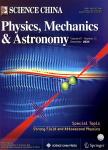Thermal smart materials with tunable thermal conductivity:Mechanisms, materials, and applications
Thermal smart materials with tunable thermal conductivity:Mechanisms, materials, and applications作者机构:Key Laboratory for Thermal Science and Power Engineering of Ministry of EducationDepartment of Engineering MechanicsTsinghua UniversityBeijing 100084China
出 版 物:《Science China(Physics,Mechanics & Astronomy)》 (中国科学:物理学、力学、天文学(英文版))
年 卷 期:2022年第65卷第11期
页 面:18-35页
核心收录:
学科分类:07[理学] 08[工学] 080501[工学-材料物理与化学] 0805[工学-材料科学与工程(可授工学、理学学位)] 0702[理学-物理学]
基 金:supported by the National Natural Science Foundation of China (Grant Nos. 51825601 and U20A20301)
主 题:thermal smart material thermal conductivity smart tuning thermal control system
摘 要:The demand for active and effective management of heat transfer is increasing in various modern application scenarios. The thermal conductivity of materials plays a key role in thermal management systems, and reversibly tunable thermal properties are one of the fundamental needs for materials. Thermal smart materials, whose thermal properties can be tuned with an external trigger, have attracted the attention of researchers. In this paper, we provide a brief review of current research advances in thermal smart materials in recent years in terms of fundamental physical mechanisms, thermal switching ratios, and their application value. We focus on typical thermal smart materials such as nanoparticle suspensions, phase change materials, polymers, layered materials tuned by electrochemistry and other materials tuned by a specific external field. After surveying the fundamental mechanisms, we present applications of thermal smart components and devices in temperature control, thermal circuits, phonon computers, thermal metamaterials, and so on. Finally, we discuss the limitations and challenges of thermal smart materials, as well as our predictions for future development.



